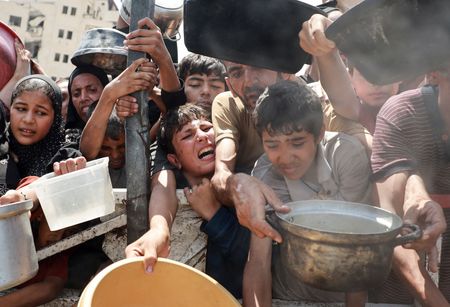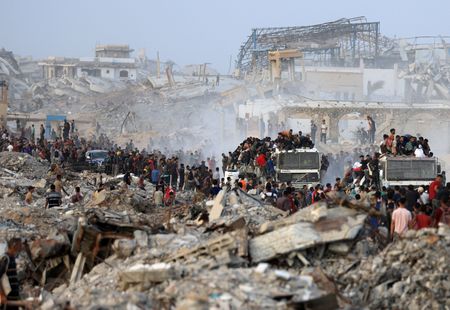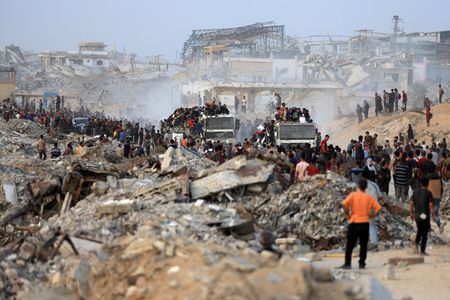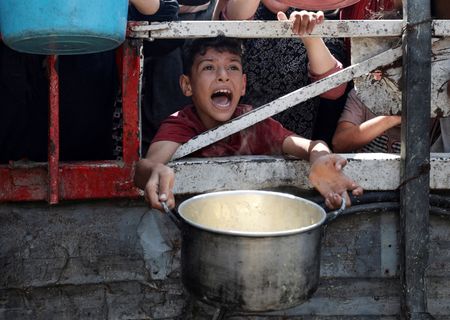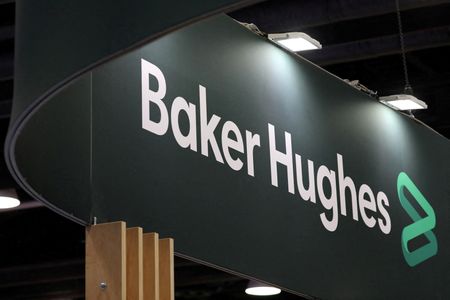By Michelle Nichols, Olivia Le Poidevin, Nidal al-Mughrabi and Andrew MacAskill
UNITED NATIONS/LONDON (Reuters) -Britain said on Tuesday it would recognise a Palestinian state unless Israel takes steps to relieve suffering in Gaza, where starvation is spreading, and reaches a ceasefire in the nearly two-year war with Hamas.
The warning came after a hunger monitor said a worst-case scenario of famine is unfolding and immediate action is needed to avoid widespread death. Palestinian authorities said more than 60,000 Palestinians were now confirmed killed by Israel’s air and ground assault on the Gaza Strip.
The hunger alert and the new death toll are grim milestones in a conflict that began almost two years ago when Hamas attacked Israel, sparking an offensive that has flattened much of the enclave and ignited hostilities across the Middle East.
The alert by the Integrated Food Security Phase Classification (IPC) raised the prospect that the man-made starvation crisis in Gaza could be formally classified as a famine, in the hope that this might raise the pressure on Israel to let in far more food.
Britain’s warning heightens pressure on Israel amid an international outcry over its conduct of the war. France announced it would recognise Palestinian statehood last week in a move that enraged the Israeli government. Israel dismissed Britain’s announcement as a “reward” for Hamas.
Prime Minister Keir Starmer told his cabinet on Tuesday that Britain would follow suit at the United Nations General Assembly in September “unless the Israeli government takes substantive steps to end the appalling situation in Gaza, reaches a ceasefire, makes clear there will be no annexation in the West Bank, and commits to a long-term peace process that delivers a two-state solution,” his government said.
The move, if carried through, would be mostly symbolic, with Israel occupying the territories where the Palestinians have long aimed to establish that state in the West Bank and the Gaza Strip with East Jerusalem as its capital.
It makes Israel appear more isolated on the international stage as a growing number of countries call for it to allow unfettered aid into Gaza, where it controls all entry and exit points to the besieged coastal territory.
However, U.S. President Donald Trump’s administration – Israel’s closest and most influential ally – has made clear it has no intention of joining others in recognising Palestinian statehood anytime soon. Since returning to office in January, Trump has left it unclear whether he would support an eventual Palestinian state.
Trump said on Tuesday he and Starmer did not discuss Britain’s proposal to recognise a Palestinian state when the two held talks in Scotland over the weekend. Trump told reporters at the time he did “not mind” if Britain did so.
EVIDENCE OF STARVATION, MALNUTRITION, DISEASE
With the international furore over Gaza’s ordeal growing, Israel announced steps over the weekend to ease aid access. But the U.N. World Food Programme said on Tuesday it was not getting the permissions it needed to deliver enough aid since Israel began humanitarian pauses in warfare on Sunday.
“Mounting evidence shows that widespread starvation, malnutrition and disease are driving a rise in hunger-related deaths,” the IPC said, adding that “famine thresholds” have been reached for food consumption in most of Gaza.
It said it would quickly carry out the formal analysis that could allow it to classify Gaza as “in famine”.
Gaza health authorities have been reporting more and more people dying from hunger-related causes. The total stands at 147, among them 88 children, most of whom died in the last few weeks.
Images of emaciated Palestinian children have shocked the world, with Israel’s strongest ally Trump declaring that many people were starving. He promised to set up new “food centres”.
Israel has denied pursuing a policy of starvation. Foreign Minister Gideon Saar said on Tuesday that the situation in Gaza was “tough” but there were lies about starvation there.
DEADLIEST CONFLICT
The Gazan casualty figures, which are often cited by the U.N. and have previously been described as reliable by the World Health Organisation, underline the war as the deadliest involving Israel since its establishment in 1948.
Israel launched its offensive in response to Hamas’ cross-border attack on October 7, 2023, when militants killed some 1,200 people and took another 251 hostage – Israel’s deadliest ever day. Since Israel launched ground operations in Gaza in October 2023, 454 soldiers have been killed.
The new Palestinian toll does not distinguish between fighters and civilians. Thousands more bodies are believed to be buried under rubble, meaning the true toll is likely to be significantly higher, Palestinian officials and rescue workers say.
Israeli airstrikes overnight killed at least 30 Palestinians in Nuseirat camp in central Gaza, Gaza health authorities said. Doctors at Al-Awda Hospital said at least 14 women and 12 children were among the dead.
The hospital also said that 13 people had been killed and dozens wounded by Israeli gunfire along the Salahudeen Road as they waited for aid trucks to roll into Gaza.
ONLY HALF OF REQUESTS APPROVED
Saar said 5,000 aid trucks had entered Gaza in the last two months, and that Israel would assist those wanting to conduct airdrops – a delivery method that aid groups say is ineffective and tokenist.
Ross Smith, a senior regional programme adviser at the World Food Programme, told reporters in Geneva by video: “We’re getting approximately 50% of what we’re requesting into Gaza since these humanitarian pauses started on Sunday.
“We are not going to be able to address the needs of the population unless we can move in the volume that we need.”
Israel and the U.S. accuse Hamas of stealing aid – which the militants deny – and the U.N. of failing to prevent it. The U.N. says it has not seen evidence of Hamas diverting much aid. Hamas accuses Israel of causing starvation and using aid as a weapon.
(Reporting by Michelle Nichols and Olivia Le Poidevin; additional reporting by Lena Masri in London; Steven Scheer in Jerusalem; writing by Michelle Nichols, Tom Perry, John Davison; Editing by Don Durfee, Kevin Liffey and Mark Heinrich)

